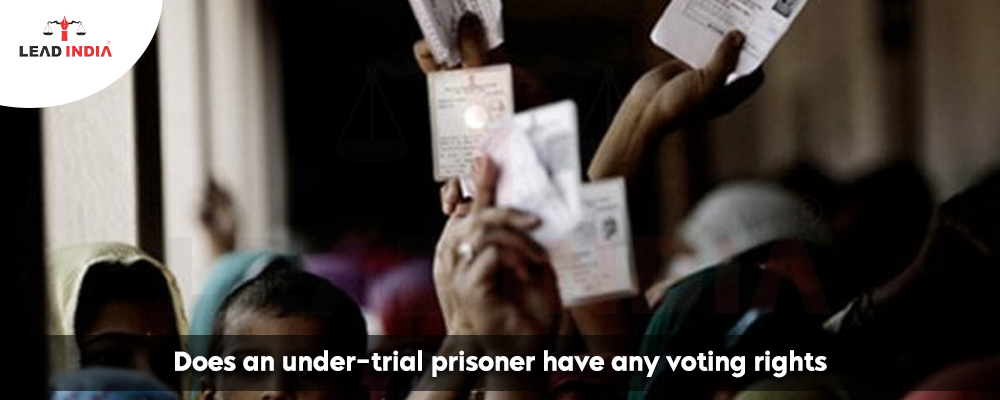India is an indirect or representational democracy that practices the parliamentary form of government. The most crucial factor is voting and actively participating in the electoral process. However, it should be mentioned that, while the right to vote is essential for the operation of a democracy, in India, there are specific grounds for disqualification. Unsoundness of mind, non-residentiality, and crime/corrupt/illegal actions are all grounds for exclusion. In a recent decision, Praveen Kumar Chaudhary v. Election Commission of India, 2019, the Delhi High Court reiterated that inmates do not have the right to vote.
Need A Legal Advice
The internet is not a lawyer and neither are you. Talk to a real lawyer about your legal issue

What are the associated consequences?
- Disenfranchises a Significant Part of the Population: According to the most recent National Crime Reports Bureau (NCRB) report for 2021, a total of 5,54,034 convicts were incarcerated as of December 31, 2021, in different jails across the country.
- The number of convicts, undertrial inmates, and detainees was recorded as 1,22,852, 4,27,165, and 3,470, respectively, accounting for 22.2%, 77.1%, and 0.6% at the end of 2021.
- The number of undertrial detainees increased by 14.9% from 2020 to 2021.
- Undermine respect for the law and democracy: Denying imprisoned convicts the ability to vote might diminish respect for the law and democracy, rather than enhancing these principles.
- Depriving: Depriving someone of their right to vote does not meet the standards for lawful punishment.
- If a convicted person can vote while on bail, why is the same privilege denied to someone who is on trial and has not yet been proven guilty of a crime by a court of law?
- Even a judgment debtor who has been arrested and held as a civilian is denied the right to vote. Civil detention differs from criminal detention.
- No Reasonable Classification: In comparison to countries such as South Africa, the United Kingdom, France, Germany, Greece, and Canada, the ban does not have a clear classification depending on the nature of the offense or the length of the sentence. This absence of classification violates the fundamental right to equality guaranteed by Article 14 (right to equality).
What provisions pertain to Under Trial’s right to vote?
Article 326 of the Constitution protects the right to vote
Individuals in the lawful custody of the police and those serving a sentence of incarceration following a conviction are ineligible to vote under Section 62(5) of the Representation of the People Act of 1951. Even if their names appear on the electoral rolls, undertrial convicts are not allowed to vote.
Only those under preventive custody can vote by mail.
It should be mentioned that the terms ‘prisoner’, ‘convict’, and ‘undertrial prisoner’ are defined in the Model Prison Manual 2016, which was released by the Ministry of Home Affairs of India.
- Prisoner: Any individual imprisoned by order of a competent authority.
- Convict Any prisoner sentenced by a court with criminal jurisdiction or a court-martial, including those confined in prison under Chapter VIII of the Code of Criminal Procedure of 1973 and the Prisoners Act of 1900.
- Under-trial detainees: A person who has been placed in judicial custody pending an inquiry or trial by a competent authority.
Essentially, the provision disqualifies everyone who is committed to prison for whatever reason, as well as anyone in police custody. This means that convicted inmates, undertrial prisoners, and anyone in police custody are ineligible to vote while in such imprisonment or custody.
Does an under-trial prisoner have any voting rights
In the Delhi High Court case of Praveen Kumar Chaudhary v. Election Commission of India [W.P. (C) 2336/ 2019], a public interest lawsuit was filed challenging the constitutionality of Section 62(5) of the Representation of the People Act, 1951. The High Court used previous Supreme Court decisions and their reasons to conclude that the portion in question is constitutionally valid.
The Delhi High Court cited the case of Anukul Chandra Pradhan, Advocate Supreme Court v. Union of India [1997 6 SCC 1], which is of great importance. In this instance, the Supreme Court ruled, when discussing the section’s constitutionality, that it is a settled principle that Article 14 authorizes justifiable categorization with a rational relationship to the goal of classification. This clause in the election legislation exempting those with criminal records was added to further the goal of preventing political criminalization and ensuring election integrity. Furthermore, it emphasized that when deciding on the legitimacy of a provision, it is critical to provide context by considering the current conditions under which the law is applied. “Political criminalization is a disgrace to society and a menace to democracy.
Lead India offers free legal advice and online information, in addition to other legal services. We provide a forum to speak with a lawyer and ask legal questions. Lead India’s solicitors can help you with any legal difficulties. Lead India’s solicitors may assist you with any legal issues. Lead India also provides free online legal help in India. In addition to giving online legal assistance, Lead India allows users to ask specialist questions for free.





 Talk to a Lawyer
Talk to a Lawyer